He was the last kitten left from his litter; all his siblings had been adopted. He was incredibly cute and affectionate. Even his name was adorable – his mom was named Miss Vickie and the kittens were named after different chip flavors, hence his name Herb. Yet this sweet boy waited patiently day after day for the purr-fect family to take him home.
You see, Herb was a kitty with special needs. He has Cerebella Hypoplasia (CH), a neurological condition where the cerebellum of the brain doesn’t develop properly. It ranges in severity from a minor wobble in an animal’s walk to extreme difficulty moving around. Kittens with CH require special families to adopt them that will be patient and understanding of their physical challenges. Enter Samantha (Sam) and Jordan Ross.
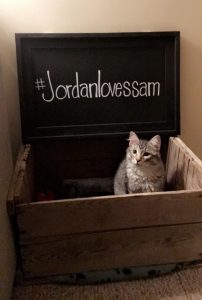
Sam shared “Shortly after our wedding, I really wanted to adopt a cat. My husband agreed to visit the SPCA Dartmouth Shelter just to see how the adoption process works. Then we spotted Herb – a tiny grey fluffy kitten asleep in his kennel. I just had to pick him up. Herb immediately began to purr and nuzzled into my shoulder. I fell in love and after all of my oohing and aahing, Jordan realized it was ‘game over.'”
Sam continued “We soon realized that Herb was a bit shaky or wobbly. I had seen a cat named Phin on Instagram (@orangeisthenewblackandtan) that had CH and wobbled like Herb did. The SPCA did a great job of sharing information with us about the disorder and what was involved in caring for a pet with CH. They also encouraged us to do more research and Jordan did so that evening. We wanted to ensure that as first-time pet parents, we could handle this. We were definitely nervous but knew that the joy Herb would bring far outweighed that. So, first thing the next morning, I went to the shelter to adopt him. Herb was the perfect wedding gift we gave ourselves!”
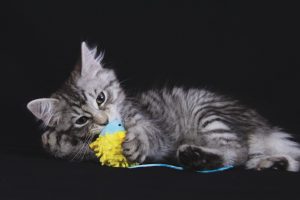
“When Herb arrived at his new home, he was very energetic and wobbly, pouncing around the floor with us,” related Jordan. “He looked very happy and quickly became comfortable. The biggest challenge for him was navigating areas of our flooring that aren’t carpeted. Because he has a hard time balancing, he relies on carpeting to grip onto with his claws. We have added many mats and rugs to our home to help accommodate him in moving from room to room.”
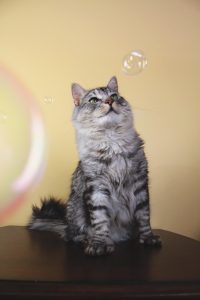
Cats with CH often rely on walls when they walk to stay up. “Herb has a mild case and is ok moving around our living room without using walls, but he stays close to them when going down the hallway,” explained Sam. “Because he can’t jump higher than two feet, we built a ramp so he could get up on our sofa and he uses a wicker hamper to climb up on our bed. Herb also has a litterbox with high walls, so he can lean against them to help keep his balance. Because he can’t hold steady when he’s eating, he sometimes gets a face full of food by accident, but we simply wipe his face and he’s good to go.”
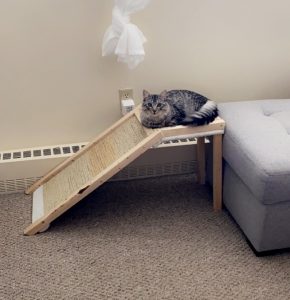
“On a lighter note, Herb’s inability to jump has allowed me to become a house-plant mom in addition to a cat-mom, since I don’t have to worry about him chewing on them!” chuckled Sam. “He always greets us at the door when we come home and sleeps on the bed with us. When we wake up, he lets us know he’s ready for his ‘morning pets’ while he kneads into his favourite blanket.”
What CH kitties lack in coordination, they definitely make up for in determination! Jordan shared “Herb loves to be outside on our deck (under supervision) and he even goes to the park occasionally wearing his harness to visit with his cat friends. He also loves playing hide and seek with me before we go to bed each night. And believe it or not, one night he was able to catch a mouse in the house and presented it to us the next morning!”
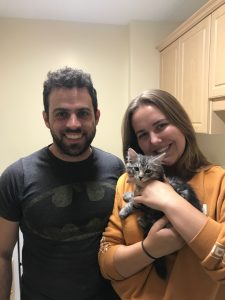
“We’ve had Herb now for two happy years,” said the couple. “He has been such a delight to our family and has truly made our house a home. Seeing him grow from kitten to cat and being able to do things has been very rewarding. He can be a handful in some instances where most cats aren’t, but he returns the love we give him ten-fold. And it melts our hearts to see him so genuinely happy.”
The couple’s advice to people about adopting a pet with special needs? “Do your research to ensure you can give your pet the home environment, care and attention they need. And continue to stay up-to-date through the years on advances or recommendations to make your pet’s life better. Even if a pet looks or acts a bit different, they’re just as sweet and deserving of love as other pets. We think that Herb’s wobbles make him extra special!”
Please consider being special and adopting a special needs pet. If you can’t adopt, you can still help to give deserving animals like Herb a chance to live their best life. Please donate today!
Understanding the commitment involved in adopting a special needs pet is crucial to a happy healthy relationship. There are important things to consider before adopting a pet with special needs.
- Think about any long-term dietary requirements, special medications or treatments your pet will need. Pets with behavioural needs may require special training; those with mobility challenges may need therapy or surgery. Ensure you can fit these costs into your family’s budget.
- Your pet may need medications/injections at specific times of day. Ensure you’re available to do this.
- Talk with your family about the challenges that come with adopting a special needs pet and ensure everyone’s onboard.
- Your pet may need more frequent vet visits. Pets with an injury or physical disability may need assistance with standing or walking. Some may need you to physically accompany them outside for bathroom breaks, as opposed to simply being let out.
The Nova Scotia SPCA makes every effort to place special needs pets with their perfect human match. Before deciding to adopt, speak to shelter staff since they’re familiar with the animal and consult with your vet to get a good understanding of the pet’s ongoing requirements. Whatever the pet’s special needs, the SPCA will be there before and after adopting to support you by providing information and advice.

